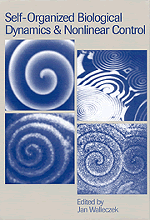 Self-Organized Biological Dynamics and Nonlinear Control
Self-Organized Biological Dynamics and Nonlinear Control Book contents
- Frontmatter
- Contents
- List of contributors
- Preface
- The frontiers and challenges of biodynamics research
- Part I Nonlinear dynamics in biology and response to stimuli
- Part II Nonlinear sensitivity of biological systems to electromagnetic stimuli
- Part III Stochastic noise-induced dynamics and transport in biological systems
- Part IV Nonlinear control of biological and other excitable systems
- Index
Preface
Published online by Cambridge University Press: 14 August 2009
- Frontmatter
- Contents
- List of contributors
- Preface
- The frontiers and challenges of biodynamics research
- Part I Nonlinear dynamics in biology and response to stimuli
- Part II Nonlinear sensitivity of biological systems to electromagnetic stimuli
- Part III Stochastic noise-induced dynamics and transport in biological systems
- Part IV Nonlinear control of biological and other excitable systems
- Index
Summary
The real voyage of discovery consists not in seeking new landscapes but in having new eyes.
Marcel ProustThe tools and ideas from nonlinear dynamics such as the concept of self-organization provide scientists with a powerful perspective for viewing living processes in a new light. As in the physical sciences before, the nonlinear dynamical systems approach promises to change scientific thinking in many areas of the biomedical sciences. For example, two rapidly evolving branches of nonlinear dynamics, popularly known as chaos and complexity studies, which have opened up new vistas on the dynamics of the nonliving world, are also beginning to impact deeply on our view of the living world. The key concept at the core of this work states that complex nonlinear systems, under conditions far from equilibrium, have a tendency to self-organize and to generate complex patterns in space and time.
Living organisms are prime examples of nonlinear complex systems operating under far from equilibrium conditions and, hence, self-organization and dynamical pattern formation is the hallmark of any living system. It thus comes as no surprise that knowledge about the nonlinear dynamics of physical systems can be successfully transferred to the study of biological systems. As a result, previously difficult to explain biological phenomena can now be understood on a theoretical basis. Importantly, the nonlinear dynamical approach is quickly leading to the discovery of novel biological behaviors and characteristics also.
Information
- Type
- Chapter
- Information
- Self-Organized Biological Dynamics and Nonlinear ControlToward Understanding Complexity, Chaos and Emergent Function in Living Systems, pp. xi - xivPublisher: Cambridge University PressPrint publication year: 2000